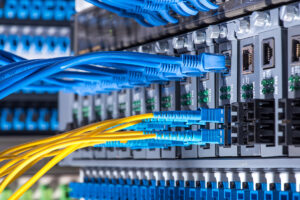
Low-voltage data networking is a better way for commercial facilities to save power while maximizing the efficiency of their data networking systems.
The need for efficient, reliable, and scalable communication networks is a serious consideration in our always-connected society. Low-voltage data networking stands at the forefront of this technological revolution, enabling the seamless exchange of data across various devices and systems. Let’s consider what low-voltage data networking is, its significance, and the number of benefits it offers to users and organizations alike.
What is Low-Voltage Data Networking?
Low-voltage data networking refers to the infrastructure and technologies that facilitate data transmission and communication using electrical currents that are significantly lower than standard household voltages. Typically, these systems operate at voltages below 50 volts. This category encompasses a wide range of technologies, including Ethernet cables, fiber optics, wireless access points, and devices connected through structured cabling systems.
The primary applications of low-voltage data networking include local area networks (LANs), wide area networks (WANs), data centers, telecommunications, and even smart home and building automation systems. By leveraging low-voltage technologies, these systems ensure safe, efficient, and high-speed data transmission, which is crucial for modern communication and operational needs.
Benefits of Low-Voltage Data Networking
- Safety: One of the foremost advantages of low-voltage data networking is enhanced safety. Low-voltage systems significantly reduce the risk of electrical hazards such as shocks or fires. This is particularly important in environments where network infrastructure is in close proximity to individuals or sensitive equipment.
- Cost-Effectiveness: Low-voltage systems are generally more cost-effective to install and maintain compared to high-voltage alternatives. The components used, such as Cat5e or Cat6 cables, are less expensive and easier to work with. Additionally, the lower energy consumption of these systems results in reduced operational costs over time.
- Flexibility and Scalability: Low-voltage networks offer great flexibility and scalability. As the demand for data transmission grows, these systems can be easily upgraded or expanded without significant overhauls. This is particularly beneficial for businesses that need to adapt quickly to changing technological requirements or increased data traffic.
- Improved Performance and Reliability: Modern low-voltage data networking technologies, such as fiber optics, provide exceptional performance with high bandwidth and low latency. This ensures reliable and fast data transmission, which is critical for applications ranging from video conferencing to cloud computing.
- Support for Advanced Technologies: Low-voltage networks are foundational for integrating advanced technologies like Internet of Things (IoT) devices, smart building systems, and other automated solutions. These networks support a multitude of devices and sensors, facilitating efficient data collection, monitoring, and management.
- Environmental Impact: The lower energy consumption of low-voltage systems translates to a reduced environmental footprint. As organizations strive to become more sustainable, adopting low-voltage networking solutions aligns with green initiatives and energy efficiency goals.
Applications of Low-Voltage Data Networking
- Commercial Buildings: In office buildings, low-voltage data networks support everything from internet connectivity to security systems and automated lighting. The scalability of these systems allows businesses to easily upgrade their infrastructure to accommodate new technologies and increased data needs.
- Healthcare: Hospitals and clinics utilize low-voltage networks to ensure reliable communication and data transfer between medical devices, patient monitoring systems, and administrative tools. The safety and reliability of low-voltage systems are crucial in these sensitive environments.
- Educational Institutions: Schools and universities benefit from low-voltage networking by providing robust internet access, enabling online learning platforms, and supporting campus security systems. The cost-effectiveness of these networks is particularly advantageous for educational institutions with limited budgets.
- Industrial and Manufacturing: Factories and manufacturing plants rely on low-voltage networks for connecting machinery, monitoring systems, and control networks. The reliability and performance of these networks are vital for maintaining smooth and efficient operations.
- Residential: In homes, low-voltage networks underpin smart home technologies, providing connectivity for devices like smart thermostats, security cameras, and home automation systems. These networks enhance convenience, security, and energy efficiency for homeowners.
TRUST THE PROFESSIONALS AT ARK SYSTEMS
Located in Columbia, Maryland, ARK Systems provides unsurpassed quality and excellence in the security industry, from system design all the way through to installation. We handle all aspects of security with local and remote locations. With over 30 years in the industry, ARK Systems is an experienced security contractor. Trust ARK to handle your most sensitive data storage, surveillance, and security solutions.
Contact ARK Systems at 1-800-995-0189 or click here today. Check us out on Facebook and Twitter as well!
